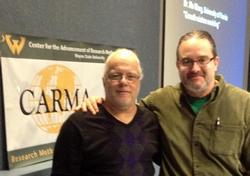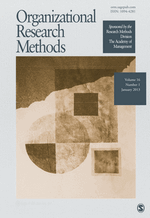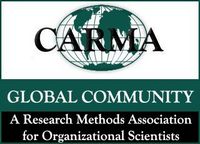ORM Editor gives CARMA Webcast Lecture on Moderated Mediation

CARMA director Dr. Larry J. Williams (left)
and ORM Editor Dr. Jose Cortina
Editor’s note: We are delighted to welcome Dr. Larry J. Williams, Wayne State University Professor of Management/Dean’s Research Chair and Professor of Psychology and Director, Center for the Advancement of Research Methods and Analysis (CARMA).
Organizational and management researchers regularly investigate models that include both mediation and moderation. Mediation is included because these researchers will measure some third variable that is proposed to mediate or explain the relationship between two other variables, such as X>M>Y. Moderation is included because often the relations among these variables may be influenced or moderated by some other variable(s). Models that include both mediation and moderation are increasingly popular, but represent a challenge as far as data analysis is concerned.
 These challenges were the topic of a lecture given recently by Organizational Research Methods Editor Dr. Jose Cortina as part of the CARMA Consortium Webcast Program. As noted by Dr. Cortina, research models have become more complex in organizational studies, with more transmitting mechanisms and boundary conditions involved. As evidence of the frequency of such models, he reported that in the 2010 and 2011 volumes of two top journals, the Journal of Applied Psychology and the Academy of Management Journal, there were 63 articles involving mediation/moderation. He also added that, unfortunately, understanding of the justification and testing of such models has not kept up with the desire to propose them. Dr. Cortina discussed several features of these articles, such as if a path diagram was included, whether full vs. partial mediation was examined, and if justification for moderation was presented. Recommendations for testing these types of models were also given by Dr. Cortina, with an emphasis on testing indirect effects. Finally, factors related to the publication process that influence research practices related to mediation/moderation were also discussed.
These challenges were the topic of a lecture given recently by Organizational Research Methods Editor Dr. Jose Cortina as part of the CARMA Consortium Webcast Program. As noted by Dr. Cortina, research models have become more complex in organizational studies, with more transmitting mechanisms and boundary conditions involved. As evidence of the frequency of such models, he reported that in the 2010 and 2011 volumes of two top journals, the Journal of Applied Psychology and the Academy of Management Journal, there were 63 articles involving mediation/moderation. He also added that, unfortunately, understanding of the justification and testing of such models has not kept up with the desire to propose them. Dr. Cortina discussed several features of these articles, such as if a path diagram was included, whether full vs. partial mediation was examined, and if justification for moderation was presented. Recommendations for testing these types of models were also given by Dr. Cortina, with an emphasis on testing indirect effects. Finally, factors related to the publication process that influence research practices related to mediation/moderation were also discussed.
 Dr. Cortina’s lecture was presented at Wayne State University, home of the Center for the Advancement of Research Methods and Analysis (CARMA). It was viewed via a webcast and its recording continues to be viewed by faculty and graduate students at many of the 120+ universities world-wide that are members of this program, and its companion program the International Video Library Program. For those who are not currently at a university belonging to CARMA’s programs, Dr. Cortina’s lecture is available for viewing free of charge (free visitor signup is required) until February 20 on the CARMA Website. It is also available, along with recordings of 19 other webcast lectures, to members of the CARMA Global Community, an international professional association whose mission is to support the research methods educational needs of faculty and students from disciplines related to organizational studies. Those seeking more information and education related to mediation/moderation may also be interested in one or more of CARMA’s Short Courses, with training led by top organizational scholars who provide hands-on experience with an emphasis on applications to management research. Additional guidance on issues related to testing mediation/moderation can be found in several articles published in ORM, and these are also freely available for a limited time using the links below. Finally, more information related to all of the above can be found in the CARMA Global Messenger, the Newsletter of CARMA and its Global Community.
Dr. Cortina’s lecture was presented at Wayne State University, home of the Center for the Advancement of Research Methods and Analysis (CARMA). It was viewed via a webcast and its recording continues to be viewed by faculty and graduate students at many of the 120+ universities world-wide that are members of this program, and its companion program the International Video Library Program. For those who are not currently at a university belonging to CARMA’s programs, Dr. Cortina’s lecture is available for viewing free of charge (free visitor signup is required) until February 20 on the CARMA Website. It is also available, along with recordings of 19 other webcast lectures, to members of the CARMA Global Community, an international professional association whose mission is to support the research methods educational needs of faculty and students from disciplines related to organizational studies. Those seeking more information and education related to mediation/moderation may also be interested in one or more of CARMA’s Short Courses, with training led by top organizational scholars who provide hands-on experience with an emphasis on applications to management research. Additional guidance on issues related to testing mediation/moderation can be found in several articles published in ORM, and these are also freely available for a limited time using the links below. Finally, more information related to all of the above can be found in the CARMA Global Messenger, the Newsletter of CARMA and its Global Community.
Estimating and Comparing Specific Mediation Effects in Complex Latent Variable Models
Experimental Tests of Mediation Models: Prospects, Problems, and Some Solutions
Testing Multilevel Mediation Using Hierarchical Linear Models: Problems and Solutions
The Relative Validity of Inferences About Mediation as a Function of Research Design Characteristics
Mediation Testing in Management Research: A Review and Proposals
On the Path to Mediation
Reflections on Mediation
Adjusting for a Mediator in Models With Two Crossed Treatment Variables
Tests of the Three-Path Mediated Effect
Testing Mediation and Suppression Effects of Latent Variables: Bootstrapping With Structural Equation Models
A Tale of Two Methods






























































































